Relocating to Qatar with loved ones is a monumental decision. Navigating the intricate visa procedures can feel daunting. Fear not, this in-depth guide will illuminate the path, detailing every step to secure family residence visas legally and seamlessly.
You can verify your visa status using Qatar Visa Check guide.
Understanding Qatar’s Family Visa Options
Before delving into the nuances, let’s grasp the fundamental types of family visas available in Qatar:
Family Visit Visa
The Family Visit Visa facilitates short-term stays, allowing close relatives of expatriate residents to visit for up to six months. This temporary arrangement caters to those seeking a brief visit with their Qatar-based loved ones.
Family Residence Visa
For those aspiring to establish a long-term home in Qatar alongside their families, the Family Residence Visa is the optimal solution. This permit enables sponsored relatives to reside in the nation for up to two years, renewable based on the sponsor’s employment contract and residential status.
Eligibility Criteria for Qatar Family Residence Visa
To ensure a harmonious family relocation, both the expatriate sponsor and the accompanying relatives must meet specific eligibility requirements. Let’s explore these vital prerequisites:
Sponsor Eligibility
As the anchor facilitating the family’s transition, the expatriate sponsor must:
- Possess a valid Qatar Residence ID and permanent residency status.
- Demonstrate financial stability by earning a predetermined minimum salary aligned with their profession.
- Provide suitable accommodation by furnishing certified rental contracts or employer-provided housing arrangements.
- Maintain an impeccable record, free from conduct violations or legal transgressions.
- Successfully pass stringent background verification checks.
Dependent Eligibility
Concurrently, the relatives aspiring to join their sponsor must substantiate their relationship through legally attested documents, including:
- Marriage certificates for spouses.
- Birth certificates for children under 21 years of age.
- Adoption papers or custody rulings for adopted children or stepchildren.
Certain exceptions may apply, such as securing special permissions for sons over 21 or married daughters. Moreover, medical clearance is mandatory for all applicants, ensuring adherence to Qatar’s public health standards.
Navigating the Application Process: A Step-by-Step Guide
With the groundwork laid, let’s delve into the intricate application process, a meticulous journey divided into four distinct stages:
Stage 1: Entry Permit Acquisition
The initial step involves securing an entry permit, granting pre-approved access for relatives to enter Qatar. Sponsors must compile an array of documents, including:
- Valid passport copies of applicants.
- The sponsor’s passport, Qatar ID, and salary certificate.
- Attested marriage and birth certificates for dependents.
- Proof of accommodation, such as rental contracts.
Ensuring clarity and accuracy is paramount. Enlist professional translation services to obtain certified English-Arabic versions of all forms and supporting materials.
Stage 2: Medical Examination
Upon arrival, all applicants must undergo mandatory medical screening at approved Qatar Medical Commission clinics. This comprehensive evaluation aims to detect and prevent the spread of infectious diseases, upholding stringent public health standards.
Applicants should carry original passports, copies, the sponsor’s Qatar ID, and a valid payment method. While vaccination records may expedite the process, minors may be eligible for exemptions in certain cases.
Stage 3: Biometric Registration
The third phase involves biometric registration at designated Ministry of Interior branches. This intricate process captures fingerprints and, in some instances, iris scans, creating a secure identification database.
Applicants must present original documents, including passports, medical clearance certificates, visa copies, and the sponsor’s Qatar ID. Meticulous attention to detail is crucial when filling out the Arabic-language fingerprinting application forms.
Stage 4: Qatar ID Card Issuance
The final hurdle is obtaining the coveted Qatar ID Card, the tangible proof of legal residency. Applicants can choose between in-person visits to Ministry of Interior centers or the convenient online Metrash2 app.
In-person applications necessitate the submission of original documents, passport photographs, and meticulously typed application forms. Conversely, the Metrash2 app streamlines the process, allowing for the upload of scanned documents and digital photographs.
Upon successful payment and approval, applicants will receive their Qatar ID cards, granting them the rights and privileges associated with legal residency, including access to public amenities, multi-entry travel, and the ability to sponsor additional visas.
Essential Documents for Qatar Family Residence Visa
Thorough preparation is key to a successful family visa application. Applicants must gather an extensive array of documents, each subject to stringent attestation and translation requirements:
- Passports: Valid for at least six months, with clear photographs and personal information.
- Visa application forms: Typed on authorized letterheads in Arabic, with separate forms for sponsors and dependents.
- Educational qualifications: Attested degree certificates or professional licenses.
- Employment contracts: Current labor contract copies attested by the employer.
- Marriage proof: Marriage certificates with certified English translations.
- Birth certificates: Children’s birth certificates clearly indicating parental names.
- Financial statements: Bank statements or salary slips demonstrating a stable income.
- Insurance documents: Proof of health or life insurance covering all applicants.
Attestation processes may involve certification from home country embassies in Qatar, Qatar’s embassies abroad, the Qatar Ministry of Foreign Affairs, and relevant administrative bodies. Certified Arabic translations of all forms, letters, and statements by approved translators are equally imperative.
Qatar’s Stringent Medical Screening
Maintaining public health standards is of paramount importance to Qatari authorities. As such, all family visa applicants must undergo a rigorous medical examination overseen by the Medical Commission under the Ministry of Public Health (MoPH).
These examinations are conducted at designated clinics nationwide and serve multiple objectives:
- Preventing the spread of communicable and infectious diseases.
- Upholding stringent health standards among residents.
- Restricting entry for applicants with serious medical conditions.
- Updating applicant records in integrated immigration databases.
The standard Qatar Visa Medical examination comprises comprehensive tests, including:
- HIV/AIDS screening.
- Hepatitis B and C tests.
- Chest X-rays to detect tuberculosis.
- Urine analysis.
- Detailed medical history consultations with licensed physicians.
Doctors directly input findings into visa databases, generating clearance certificates upon successful completion of all tests. While mandatory for most ages, some minors below 12 years may be eligible for exemptions, and vaccination histories can expedite the process.
Biometric Registration
In line with stringent immigration protocols, biometric registration is a crucial step in the family visa acquisition process. This involves the collection of unique physical identifiers, primarily fingerprints and, in some cases, iris scans.
Applicants must visit designated Ministry of Interior (MOI) service centers, presenting original documentation such as passports, medical certificates, visa copies, and the sponsor’s Qatar ID. Standardized fingerprinting application forms must be accurately completed in Arabic to avoid delays.
State-of-the-art scanners capture high-resolution fingerprint images, which are encrypted and stored in secure centralized databases along with iris scans. These biometric records are cross-referenced against global watchlists, enabling Qatar’s security services to:
- Uphold national security through comprehensive identification.
- Investigate crimes and fraudulent activities using biometric evidence.
- Conduct routine checks during immigration procedures.
- Update records following visa renewals, cancellations, or status changes.
With robust data redundancy and backup systems, Qatar’s biometric registration process ensures the integrity and accessibility of applicant information, fortifying the nation’s security measures.
Qatar ID Card: Your Key to Residency
Upon successful completion of all preceding stages, applicants receive the much-awaited Qatar ID Card – a tangible embodiment of their legal residency status. These government-issued, laminated cards display crucial information, including:
- Full names of the holder.
- Recent photographs for visual identification.
- Fingerprint data for biometric verification.
- Unique national ID numbers assigned to each resident.
- Residence privilege category, indicating the holder’s status.
- Expiration date, dictating the validity period of the card.
Possession of a Qatar ID Card entitles holders to a range of rights and privileges, including:
- Legal residency and permission to reside and work within Qatar’s borders.
- Unimpeded access to public infrastructure, amenities, and services.
- The ability to travel in and out of the country multiple times during the validity period.
- Authority to sponsor additional visas, such as driving licenses and vehicle registrations.
However, these cards are subject to annual renewal, ensuring the continuous validity of the holder’s residential status. Failure to renew in a timely manner can result in penalties and potential cancellation of the residency permit.
In the event of unforeseen circumstances like loss, theft, damage, or errors in personal data, residents can apply for replacement Qatar ID Cards by filing requests accompanied by supporting documentation, such as police reports in cases of theft or loss.
Financial Considerations: Budgeting for Family Relocation
While the prospect of reuniting with loved ones in Qatar is enticing, it’s crucial to account for the associated financial costs. Both direct processing fees and indirect expenses should be factored into comprehensive budgeting:
Normal Processing Fees
- Online application fee: QR 200 per person
- Medical examination fee: QR 100 per person
- Annual residency permit fee: QR 500 per person
- Biometric registration: Typically no charge
Expedited Processing Options
For those seeking expedited services, additional fees apply:
- Premium visa fee: QR 600 per person
- Rapid medical examination: QR 150-300 per person
- Express residency permit issuance: QR 800-1000 per person
Penalties and Fines
Delays or infractions can result in substantial penalties, such as:
- Daily tardiness fees of QR 100 for expired status conversions or renewals
- QR 5,000 fine for expired Qatar ID Cards
- QR 10,000 penalty for avoiding biometric registration
Indirect Expenses
Beyond the official processing fees, applicants should account for auxiliary costs, including:
- Document attestation and certification charges
- Professional translation fees for certified Arabic versions
- Typing charges for application forms
- Transportation and logistics expenses
- Temporary accommodation, if required
Thorough financial planning, considering both direct and indirect costs, is essential to ensure a seamless and stress-free family relocation to Qatar.
Frequently Asked Questions
To address common inquiries, we’ve compiled a list of frequently asked questions (FAQs) regarding Qatar’s family residence visa process:
Q: Who is eligible to sponsor family visas in Qatar?
A: Expatriate professionals working in Qatar for over two years, earning a minimum monthly income of QR 10,000 or more, can sponsor their family members.
Q: Which family members are eligible for sponsorship?
A: Eligible family members include the legal spouse, unmarried children under 21 years of age, and, in certain cases, parents of the sponsor.
Q: What documents require attestation during the application process?
A: Documents that typically require attestation include financial statements, educational qualifications, marriage certificates, birth certificates, and tenancy or accommodation contracts.
Q: How can I check the status of my family visa application?
A: Application status can be tracked online through the Metrash system using provided credentials or via SMS notifications to registered mobile numbers.
Q: Where do the mandatory medical tests take place?
A: Medical examinations are conducted at approved Medical Commission centers and select hospitals authorized by Qatar’s Ministry of Public Health.
Q: What are the fees associated with the medical checks?
A: The standard fee for medical examinations is QR 100 per person. However, minors may be eligible for exemptions in certain cases.
Q: How do I register biometric data for my family’s visas?
A: Biometric registration takes place at designated Ministry of Interior service centers. Applicants must walk in with the required documents, such as passports, medical clearance certificates, and the sponsor’s Qatar ID.
Q: What recourse is available if my family visa application is rejected?
A: In the event of a rejected application, sponsors can file an appeal with Qatar’s Immigration Department, providing clarifications and additional supporting documentation as required.
Q: Are there any authorized advisors or resources for further assistance?
A: Yes, several licensed immigration consultants and legal firms in Qatar specialize in family visa procedures. Their expertise can be invaluable in navigating the process smoothly.
Conclusion
Qatar’s family visa system is a testament to the nation’s commitment to facilitating seamless relocation for expatriates and their loved ones. While the process may seem intricate, with its extensive requirements and stringent scrutiny, it ensures only deserving cases secure approvals.
For expatriate sponsors, meticulous preparation of paperwork, patient follow-up, and adherence to guidelines are paramount. Likewise, visiting relatives must uphold lawful conduct and maintain the utmost respect for Qatar’s customs and regulations.
As global mobility continues to rise, Qatar strikes a balance between operational efficiency and regulatory oversight through its family visa system. Online portals like Metrash have revolutionized the application experience, while in-person verifications maintain authenticity and security.
Ultimately, Qatar’s family residence visas pave the way for expatriates to build fulfilling lives alongside their families, fostering a diverse and inclusive society that embraces the rich tapestry of cultures worldwide.

Hey there, I’m Hamza Al-Abdullah, the brains and heart behind Qatarvisacheck.qa. Proudly rooted in the bustling city of Doha, Qatar, I’ve made it my mission to untangle the visa web for fellow travelers. My website isn’t just a hub for visa info; it’s a personalized journey through the often confusing world of travel documents.

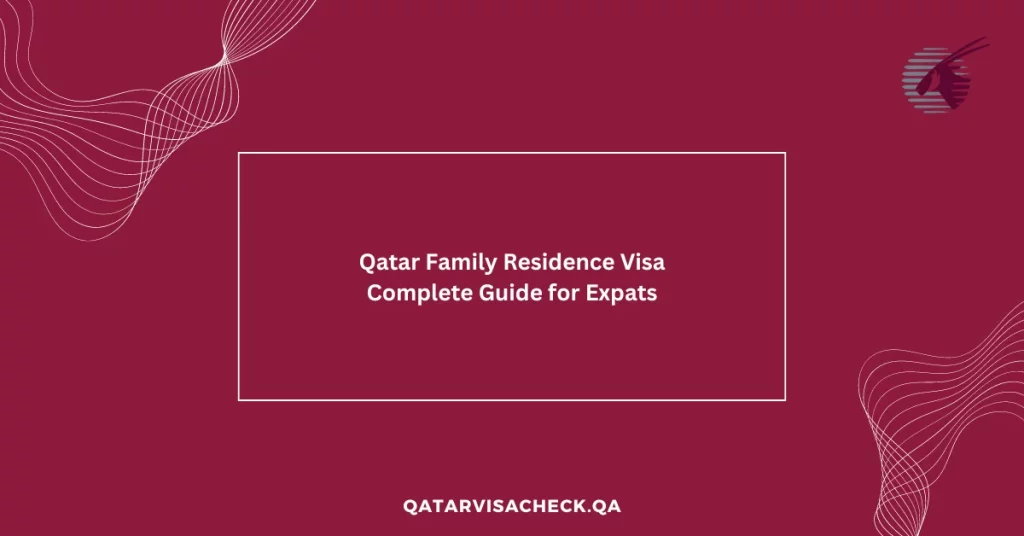
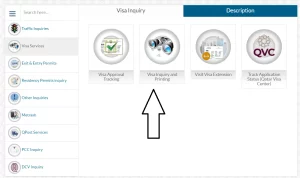
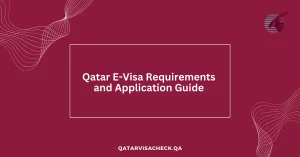
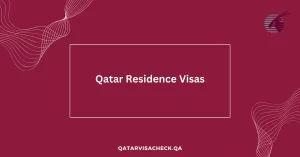

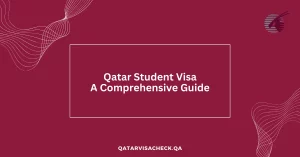
![Qatar Visa Options for GCC Residents [2024] Qatar Visa for GCC Residents](https://qatarvisacheck.qa/wp-content/uploads/2024/03/Qatar-Visa-for-GCC-Residents-300x157.webp)